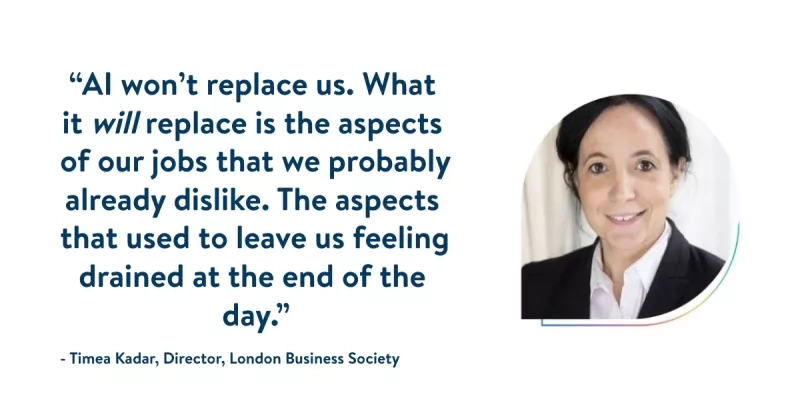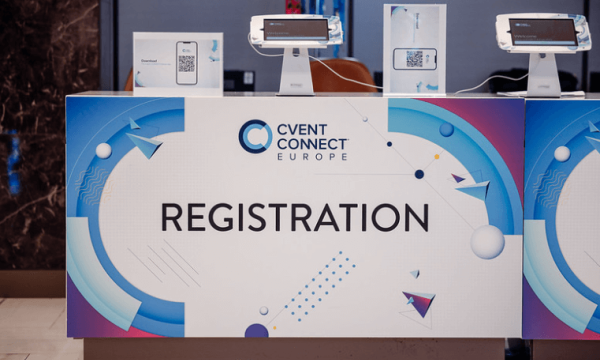Event marketers are a busy bunch. Whether creating promotional content, managing post-event follow-ups, or analysing event success, there's a lot to do and little time to do it all. So, how can AI help?
Timea Kadar, Director of London Business Society, shares tips on how AI can make event marketers' lives easier, ways to use AI for event marketing, and why marketers have nothing to fear about AI replacing them.
Check out the links below to jump to the relevant section:
- The secret(s) to getting the most from AI
- 6 ways AI can save event marketers time and hassle
- Top tips for using AI for event marketing
💡Hear from Timea Kadar on how to use AI to create great event content in this Cvent CONNECT Europe session:
The secret(s) to getting the most from AI
Use it to boost creativity
Creativity is essential for any event marketer, but prioritising it is easier said than done. Time constraints and a never-ending to-do list can leave little room for brainstorming new event marketing ideas.
“As marketers, we often don’t have the time or the headspace,” says Timea. “Many marketing teams are stretched and don’t have the luxury of dedicating lots of time to coming up with fresh ideas.”
AI can provide a valuable platform to bounce ideas from, although it won’t necessarily give you the final idea. Timea recommends starting with a broad theme or topic to see what the tool comes up with.
“From there, you can pick one of the outputs or combine them and ask again. Not only does this give you many ideas to choose from, but it’s also a great way to feed your brain so that you can come up with more ideas of your own.”
Integrate it into your workflows
To get the most out of AI tools, Timea suggests integrating them into your existing workflow.
She explains: “When I have the theme for the event, I use tools like Buzzsumo to understand the trending topics on that theme. You can see stats like how much a post has been shared on various social media channels and the authors posting about it. This can help you reach out to potential speakers or people who might help promote your event.”
For Timea, the goal is simple – to come up with ideas that will interest your audience. “And with AI, you can come up with really great and intriguing angles that not everybody else is doing.”
“Once the AI tool knows the audience, the persona, the tone of voice, and also the style you'd like, then it will usually give you back a very good first draft to work from.”
Use to support content creation
One of the most effective ways event marketers can take advantage of generative AI is for content creation.
Timea shares an example of a recent client event that used the theme of the 1920s and had a speakeasy-style venue. AI proved incredibly helpful in writing the promotional copy for the event. “We were able to ask ChatGPT to write the copy in the style of the era,” she explains. “Just like that, we had an authentic copy, which saved us from having to do additional research on how people spoke back then.”
But while ChatGPT and other generative AI tools can provide a great first draft to work from, Timea stresses the importance of always reviewing and editing any output you get.
💡 Read more: ChatGPT 101: 7 Winning Prompts for Your Next Event
6 ways AI can save event marketers time and hassle
1. Landing pages
Your event landing page is crucial for driving registrations and conversions. AI can help you customise the copy of your landing page to resonate with your audience.
Timea explains: “If you have an event with different audiences, you can use AI to help you change the style or tone of voice to match that audience.
“You can switch it up to suit whatever your event needs. You can ask it to make your copy more futuristic, businesslike, or elegant – whatever you choose. And you still have the power to edit the output.”
2. Social media content
Generative AI can help you speed up the content creation process and avoid repetition on your social media platforms. For example, you can use it to provide multiple versions of a post.
“What I’ve seen event marketers use very well is when they already have a post, and they ask ChatGPT to provide 10 versions, for example," says Timea. "So when they post across their social media platforms, they're not repeating the same post."
3. Email copy
Email marketing is part of any successful event promotion strategy, but writing email copy can be time-consuming. Timea suggests using AI for your email sequences. “You can ask it to write a sequence of emails and specify what you want highlighted in each, as well as what the call-to-action should be.”
4. Speaker bios
Making sure your speaker bios are consistent can be tedious. While AI can speed up the process, the key is to be specific.
“You can tell it how many words to use,” says Timea. “You can be specific and say, ‘Make these bios no longer than 300 words’, for example. You’re telling the tool to make the bios consistent and have the same length so you don’t have to rework them yourself. But, of course, you must proofread the output.”
5. During the event
Keeping up with social media posting during the event is tough, but it’s a great way to maintain the buzz around the event. One solution is to use AI to plan ahead.
“If you have several speakers, you can ask ChatGPT to come up with a pre-session announcement for each speaker who comes onstage,” says Timea. “You can tell it what to say, what the call-to-action is, and even schedule these posts in advance.”
6. After the event
With AI, you can create post-event emails, thank-you emails and more. But there’s more that you can do with your content once the event is over.
Timea explains: “If you record the presentations, you can use tools like veed.io to generate subtitles for the videos and download them in a txt file, which essentially means that you’ve converted the video into text.”
Timea suggests using these files to get more mileage from your content. “You can take the key takeaways and publish blog posts that include quotes from the speaker, or you could convert it into a handbook for attendees.
“We often include this content as part of the package when people buy their tickets,” she says. “We tell attendees they’ll get the talks as a video and an extract in a handbook. And people really would like to have it because they don't have to watch the video after the event.”
“Your prompt matters a lot – the same way it matters when you brief an agency or colleague. If we don’t give enough information, we don’t get back the same quality as when we do.”
Top tips for using AI for event marketing
- See your prompt as a brief: The more specific information you give to the AI, the better the output will be. “You have to teach the AI tool, almost like you would an assistant,” says Timea. “So include details like the persona(s) attending the event, the topic or theme, the benefits of attending, key takeaways, agenda, testimonials, etc. This is the same information you’d need to put together were you to write a brief for an agency.”
- Be open-minded: Demos can be a great way to understand what’s out there. As Timea says, “With demos, you’ll not only learn about that tool, but you’ll also broaden your horizons on what can be done with AI in general.”
- Try one tool at a time: At the same time, Timea cautions against getting carried away. “I would introduce one tool at a time. Choose an area to optimise and find a tool to help you with that use case.”
- Don’t rely on AI for everything: “When we feel overwhelmed, there’s a risk that we just accept whatever our AI tool gives us because that’s easier,” says Timea. “But we should always ask, ‘Can this be done better? What’s wrong with this? What else could I add?’”
- Know the limitations of the specific tool: “It’s not just knowing the limitations of AI generally; it’s also about knowing the limitations of the platform you’re using,” says Timea. “For example, ChatGPT won’t show you the most recent trends. It can’t give you stats on how much a particular piece of content was shared.”
- Check, check, and check again: While AI can automate many tasks, it's important not to accept the output it produces unquestioningly. “You always need to fact-check and, when it comes to research, check the source,” says Timea.
- Don’t fear AI – embrace it: The biggest takeaway, Timea says, is this: “AI won’t replace us. What it will replace is the aspects of our jobs that we probably already dislike. The aspects that used to leave us feeling drained at the end of the day.”
“You’ll find things that you’ll want to change. But that annoying part of having to rework or rewrite again and again, that’s time can be saved with AI – which I think we can all agree is a big thing.”
Timea Kadar is the Director of London Business Society, which organises 100 sold-out networking events each year. She has over 23 years of experience in marketing and copywriting and has held C-level marketing positions at FTSE 500 companies. Timea also delivers copywriting training for event organisers, which includes the use and implementation of AI systems.










